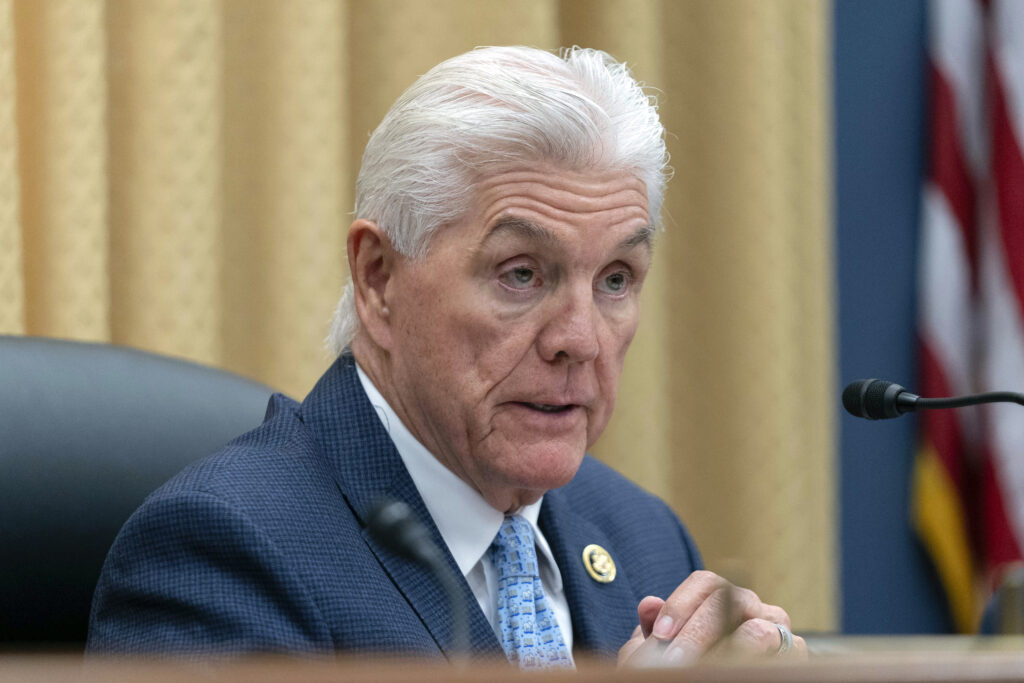
EXCLUSIVE — The State Department is facing a congressional subpoena for failing to turn over records on programs Republicans say cultivated “censorship-by-proxy and revenue interference of American small businesses,” the Washington Examiner has learned.
The subpoena, which was served late Thursday by the House Small Business Committee, is the latest development in a one-year investigation into an embattled State Department-housed office called the Global Engagement Center, which the Washington Examiner reported granted $100,000 to the Global Disinformation Index. The latter group, which is based in London and has an affiliated nonprofit organization registered in the United States, works to pressure advertisers to boycott conservative media outlets.
That the U.S. government funded the Global Disinformation Index, or GDI, inspired a new law last year banning some Pentagon money from being allowed to go to the London-based organization, which lost a key partner in Microsoft amid scrutiny. The funding also prompted an ongoing lawsuit brought by the Federalist and the Daily Wire, two right-leaning websites, against the Biden administration for propping up “one of the most egregious government operations to censor the American press in the history of the nation,” according to a complaint. Oracle announced it was cutting ties with GDI in 2023, though a report from April of this year indicates the corporation still has a relationship with the British group.
The House Small Business Committee, which is chaired by Rep. Roger Williams (R-TX), has hit constant roadblocks while seeking to extract sprawling financial records from the Global Engagement Center, or GEC, related to alleged censorship. Last summer, the committee asked the GEC for an unredacted list of the office’s grant recipients since 2019, followed by requests for records on awards to purported disinformation tracking groups such as GDI, the New York-based company NewsGuard, and other entities.
But the investigation took a turn late last year upon the GEC sending Republicans grant records marked “sensitive but unclassified” and “not for public release.” They were heavily redacted and just five pages — hardly encompassing what lawmakers had requested. Then, in February, Republicans accused the State Department of threatening to obstruct their investigation. That contention was in response to a top GEC official sending a letter to the committee asserting the GEC may only allow it to review records in private, and not obtain separate copies, due to Republicans allegedly releasing grant records to the Washington Examiner.
However, the outlet’s story in January did not say who the source was that provided records on condition of anonymity. The GEC’s threatening letter was “beltway-ese for ‘We wouldn’t mind knowing the Examiner’s sources,’” in the telling of “Twitter Files” journalist Matt Taibbi, who wrote a February article on the matter.
“All Americans deserve a fair shot to compete in the marketplace, and the government should not be tipping the scales against any business for their legal speech on the internet,” Williams told the Washington Examiner. “The refusal to comply with repeated document requests is unacceptable, especially when the livelihoods of many small businesses are on the line.”

Williams, in a letter Thursday to Secretary of State Antony Blinken and the GEC’s James Rubin, slammed the State Department for its “refusal to produce the requested information.” The subpoena, which was reviewed by the Washington Examiner, listed a June 27 deadline for the GEC to produce documents.
One document Republicans requested is a GEC-housed file appearing to have originated on Feb. 14, 2023, called “GEC-GDI-BLACKLIST.” It corresponds to the name of a file mentioned, though not included, in internal GEC records obtained by the Washington Examiner through the Freedom of Information Act.
Republicans asked for documents related to a defunct GEC platform called Disinfo Cloud, a key focus of the Federalist and Daily Wire’s lawsuit. Disinfo Cloud was managed by Park Advisors, an investment group that steered the GEC’s $100,000 grant in 2021 to GDI, the British group. The Federalist and the Daily Wire, the two conservative media outlets suing the State Department, argued in their lawsuit that Disinfo Cloud operated as an “alter ego” of the government to “fund censorship technology.”
Moreover, the House Small Business Committee subpoenaed the GEC for records on any of the office’s funding awards since 2018 to other organizations. The subpoena also singled out almost two dozen groups that the committee specifically wants information about, including GDI, NewsGuard, and Park Advisors.
Republicans asked for records on any GEC funding to the Atlantic Council and a lab at the think tank connected to alleged censorship of disfavored speech. The subpoena listed Albany Associates, a British group aiming to thwart alleged disinformation that has partnered in recent years with the U.K. government. It also listed the Institute for Strategic Dialogue, a London-based think tank that, the Daily Caller reported, partnered with the State Department and private companies as it labeled right-of-center viewpoints as “disinformation” or “misinformation.”
“While the committee does not take issuing a subpoena lightly, the GEC’s repeated failure to comply with our requests has left us with no other option,” Williams told the Washington Examiner.
The subpoena comes after Williams attached an amendment to the 2025 defense policy bill, which passed the House and will be negotiated in the Senate, that would prohibit the Pentagon from funding groups working to demonetize other groups in the U.S. over their lawful speech. The amendment also singled out GDI and NewsGuard — the latter of which House Oversight Committee Chairman James Comer (R-KY) launched an investigation into last week over alleged censorship operations.
The GEC is up for reauthorization this year but could lose funding if the office fails to earn approval from Republicans, who are increasingly frustrated over the GEC’s ties to left-leaning groups taking aim at right-leaning speech. Since forming in 2016, Republicans say, the GEC has gone out of its way to get involved in censorious activities that run contrary to its overseas-focused mission to thwart “foreign state and non-state propaganda.”
Meanwhile, a new provision through the annual State Department appropriations bill, which will soon be up for a House floor vote, also aims to ban future funding to the GEC, according to the bill text.
One senior Republican aide who pushed for the provision called it a “landmark oversight move by Congress” that would be “a blow to the censorship regime the Democrats built, financed, and abused.” Rep. Darrell Issa (R-CA), one of the main lawmakers who has helped lead the investigation into the GEC, said the office is anything but bipartisan.
CLICK HERE TO READ MORE FROM THE WASHINGTON EXAMINER
“That it descended this far — into a partisan political office housed in the State Department that targeted conservatives and sought to censor their free speech — is the core reason why this kind of decision by Congress is both warranted and overdue,” Issa told the Washington Examiner.
The GEC did not respond to a request for comment.





